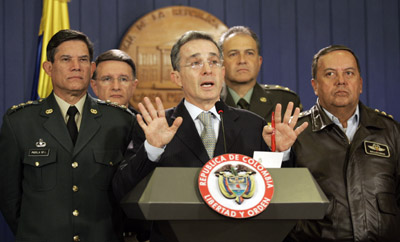Americas
2010
Attacks on the Press 2009: Introduction
By Joel Simon Does “name and shame” still work in the Internet age? After all, the massacre of 31 journalists and media workers in the Philippines pushed the 2009 media death toll to the highest level ever recorded by CPJ. The number of journalists in prison also rose, fueled by the fierce crackdown in Iran.

In the Americas, Big Brother is watching reporters
By Carlos Lauría The topic being investigated by two Colombian reporters was explosive enough that it required unusual security. Fearful that the subjects would learn prematurely of the story, the reporters took separate notes, which they did not share and which they later destroyed. They didn’t communicate by telephone or e-mail, and they met only…

As fighting surges, so does danger to press
By Bob Dietz As the United States redeploys forces to Afghanistan, and the Pakistani military moves into the country’s tribal areas, the media face enormous challenges in covering a multifaceted conflict straddling two volatile countries. Pakistani reporters cannot move freely in areas controlled by militants. International reporters in Afghanistan, at risk from kidnappers and suicide…
Attacks on the Press 2009: Argentina
Top Developments• New broadcast law sparks contentious debate, raises concerns.• In major victory, criminal defamation laws are repealed. Key Statistic 200: Tax agents who raided Clarín in apparent reprisal for the newspaper’s coverage. Press freedom advocates won two important victories as congress decriminalized defamation, and a federal court issued a ruling that, while still under appeal, could…
Attacks on the Press 2009: Brazil
Top Developments• Judges in defamation cases issue sweeping censorship orders.• Ex-police officers convicted in abduction, torture of O Dia journalists. Key Statistic 44: Defamation lawsuits filed by a single congressman. Complaints target dozens of journalists for critical coverage. In a major advance for press freedom, Brazil’s highest court struck down a repressive 1967 law that criminalized broad…
Attacks on the Press 2009: Colombia
Top Developments • Provincial journalists face threats from all sides in civil conflict. • Convictions gained in one journalist murder; progress reported in other cases. Key Statistic 2003: Year that national intelligence agents began spying on journalists and other critics. The strained relationship between the government and the Bogotá-based independent press worsened after news media…
Attacks on the Press 2009: Cuba
Top Developments • Vibrant blogging culture emerges despite severe Internet restrictions.• Jailed journalists suffer amid inhumane conditions. Key Statistic 22: Reporters and editors in jail as of December 1. Cuba was hit hard by the global economic crisis and endured an upheaval in its highest offices, but state-controlled news media delivered superficial and skewed coverage.…
Attacks on the Press 2009: Ecuador
Top Developments • Correa assails news media, and regulators target critical outlets. • Media legislation could restrict freedom of expression. Key Statistic 3: Days that regulators ordered Teleamazonas off the air. Re-elected by a landslide in April, President Rafael Correa intensified his attacks on critical news media, calling them ignorant and deceitful. As Correa used…
Attacks on the Press 2009: Honduras
Top Developments • Coup damages press freedom, reveals partisan media divide. • Supporters of both sides in the conflict wage attacks on the press. Key Statistic 22: Days that Radio Globo and Canal 36 were off the air due to government censorship. The June coup that ousted President Manuel Zelaya, along with the bitter stalemate…
Attacks on the Press 2009: Mexico
Top Developments• Amid threats and attacks, self-censorship becomes more pervasive.• Congress stalls on reforms to combat violence against the press. Key Statistic 9: Journalists missing since 2005. Most had covered crime and corruption. The deepening influence of organized crime and the government’s inability to curb worsening violence left the news media wide open to attack.…